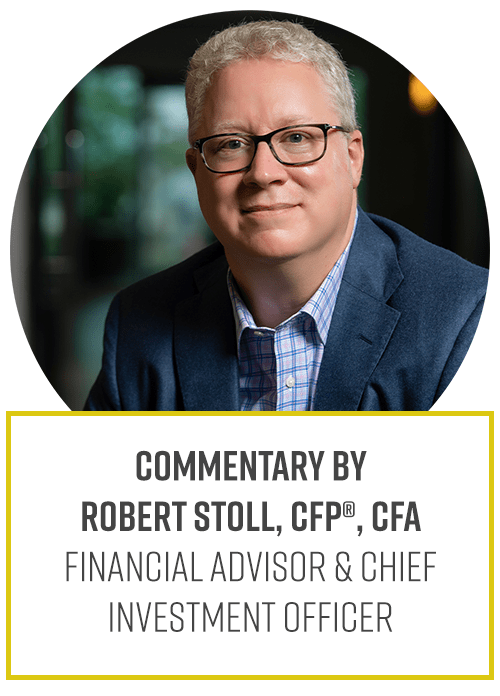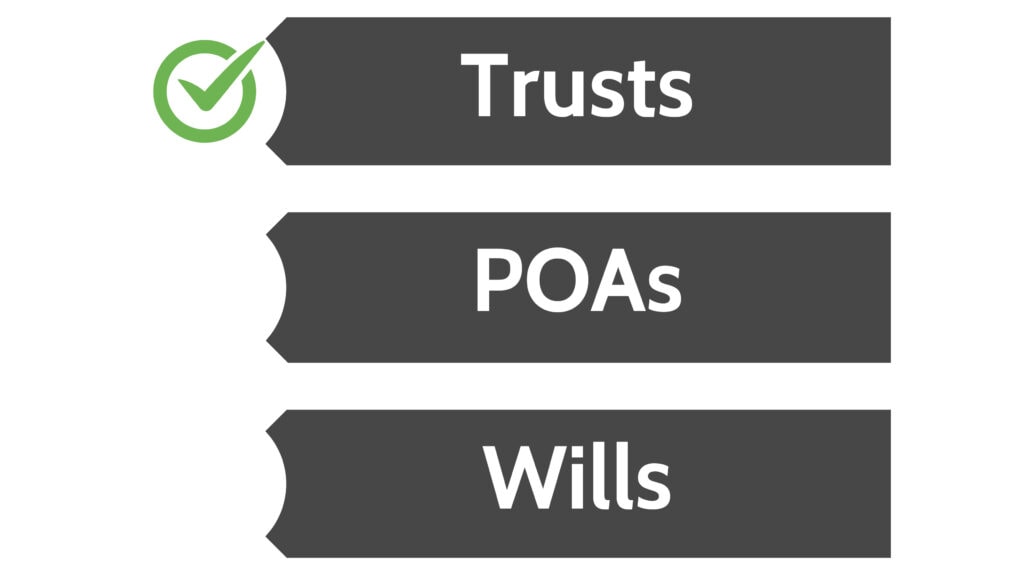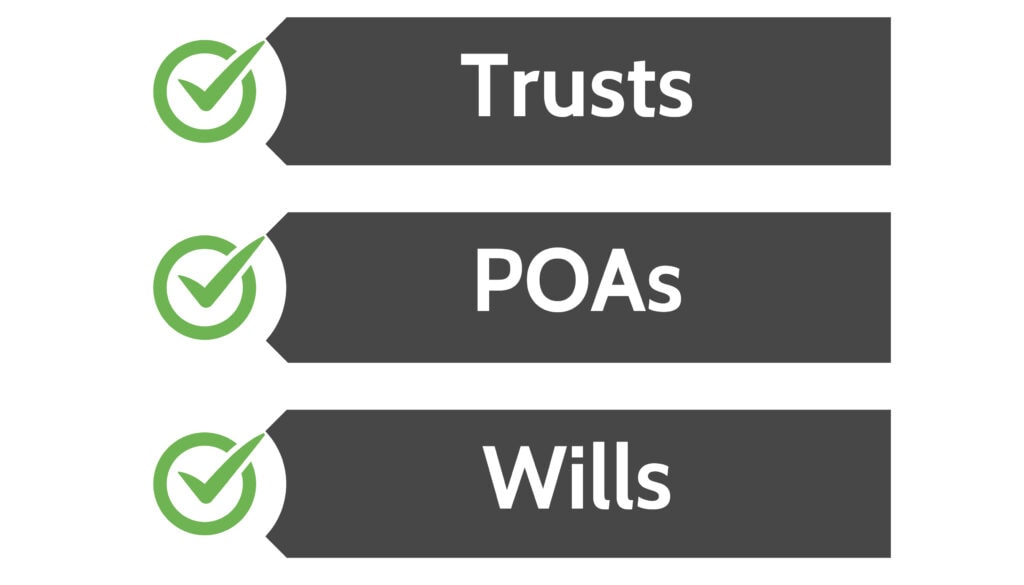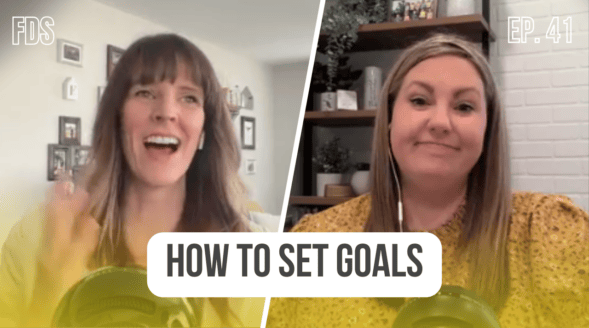Estate Planning Checklist
by Rob Stoll, CFP®, CFA Financial Advisor & Chief Financial Officer / September 27, 2023
There are few things harder for financial advisors than motivating clients to get estate planning documents in place. It’s right up there with being told by the doctor that you need to eat more vegetables and get more exercise to shed weight. “Yeah, yeah, yeah, I’ll get to that real soon, doc!” Few people want to talk about what’s going to happen when they die or become incapacitated. Yet there is a 100% certainty we’ll be dealing with our own death at some point. Why not prepare for that certainty in advance and spare our loved ones the stress of sorting out our affairs? This estate planning checklist helps you understand what estate planning is, and why it’s important.
This Estate Planning Checklist Matters
Most people who think of leaving a legacy for their loved ones either think of the money their kids will inherit or how they’ll be remembered. Those are very important ways to leave a legacy. But sometimes, the best legacy you can leave your family is a coherent plan of what happens and who-gets-what when you’re gone. A strong estate plan is a gift to your family.
If you pass away or become incapacitated without estate planning documents in place, you’re risking:
- State probate courts deciding who ends up with your money and property.
- High legal fees.
- Months and months of time for your loved ones to sort things out.
- Family infighting, as everyone tries to grab their share of your money.
- Chaos of the remaining family deciding who’s in charge of selling your home, having an estate sale, and settling your debts.
With an estate plan, you make all the hard decisions about what happens to your property when you’re no longer around. You’re effectively handing your family a checklist of things to do. No arguing over who gets what. No arguing over how much each child gets, or when they get it.
And that – this estate plan – might end up being the gift that keeps harmony in your family for future generations. So use this estate planning checklist as a tool to make sure you set your family up for success!
Trusts: Administrators of Your Estate
One of the biggest misunderstandings of estate plans is that you only need a trust if you’re wealthy. Not true! In fact, if you pass away or are incapacitated, having a trust in place gives your loved ones a clear roadmap of what to do. They can also make it easier to work with banks and doctors in the event you’re still alive but no longer able to make key decisions. Here are some key concepts to know about trust and how they work in an estate plan.

Key Concept: Living (Revocable) Trusts
A trust that you create while you’re alive. As the name implies, it’s revocable – meaning you can get rid of it when you want. It also means that you can change it at any time. The living trust is a separate legal entity that handles your affairs when you’re no longer able to.
An example of how a living trust works is when a family has young children. Suppose a married couple has three teenage children and a $1,000,000 IRA. If they name the three children as beneficiaries of the IRA, each of them will get ⅓ of the IRA after the parent passes away. How do we think a teenager is going to handle a $300,000+ check that’s handed to them? Probably not well!
Instead, the parent can name their living trust as beneficiary of their IRA. And within the trust document, they can spell out how much each child will get and at what age, such as $100,000 at ages 21, 25, and 28. Creating a distribution schedule in the trust gives the parent complete control over the handling of their assets.
Key Concept: Successor Trustees
The successor trustee is the person you nominate to follow the wishes you spell out in your trust. Many people mistakenly believe that the successor trustee has to be the oldest child, or that it’s a position of “honor.” Nor does being named successor trustee entitle them to more money.
When selecting your successor trustee, you want to pick someone that you know has time and organizational skills. Being a trustee can be a lot of work. And if there are several beneficiaries of a trust, then having a trustee that is organized and can deal with people is critical.
Once you select a successor trustee, it’s a good idea to communicate that to them and your trust’s beneficiaries. Let them know why you chose that person and what you’re expecting from them. That way, there’s no surprise when you pass away. Watch our video detailing the differences between acting as a trustee and acting as a P.O.A.
Key Concept: Incapacity
Most believe that trusts only spring into action after someone has passed away. But they’re also valuable estate planning tools to deal with someone’s incapacity. By incapacity, we mean a health or mental issue that prevents someone from handling their own affairs. As a guest on the FDS Podcast recently said, financial institutions are more apt to work with a trustee versus working with someone holding a Power of Attorney.
Powers of Attorney: Who Handles Your Affairs if You’re Incapacitated?
The risk of becoming incapacitated in your life is real. Sadly, the incidence of Alzheimer’s and other memory care diseases is common. Even if someone doesn’t have a decline in mental health, their spouse may have passed, taking away the natural person to make healthcare and financial decisions for them.
There are two types of Powers of Attorney (“POAs”) to be aware of.
Power of Attorney for Property: This is a document that designates someone to handle financial affairs for someone. Suppose someone is in the hospital for an extended period. The mortgage, cable bills, and auto insurance will not get put on hold until they’re out. Having a POA for Property allows someone else to handle the day-to-day financial affairs – such as paying bills – until the family member has recovered.
Power of Attorney for Healthcare: Doctors are going to be looking for someone to make health decisions on behalf of someone who’s incapacitated. The POA for Healthcare is the document that designates who gets to make those decisions. This is very important. If a loved one needs urgent care, the family can’t waste time trying to figure out how to make decisions.
Wills: Designating Guardians for Minor Children and Handling Non-trust Assets
The final major piece of an estate plan is the Will. This is the most common part of an estate planning concept that people are familiar with. But it’s more than scribbling notes on a piece of paper saying who’s going to get the fine china and who’s going to get family heirlooms. Wills only become active after someone has passed away, unlike trusts and POAs.

For young families, a Will is absolutely critical. Who’s going to take care of your children if something happens to you and your spouse? Assigning guardianship over your children must be carefully considered. If you designate parents to care for your children, you need to make sure they can do that. You’d also need to update your will if your parents pass away while your children are still minors.
The Documents of the Estate Planning Checklist
What Happens if I Don’t Have an Estate Plan?
I touched on this at the beginning of this article but it’s worth emphasizing what happens if you don’t have an estate plan. Every state is different, but in the State of Illinois, if you pass away without estate planning documents:
- An Illinois Probate Court will handle your estate. This court can assess fees of thousands – even tens of thousands – of dollars.
- If there are disputes between family members, a judge is going to make the key decisions. Expenses will also be a lot higher.
- A surviving spouse does NOT get 100% of their spouse’s assets. In fact, 50% of assets would go to the spouse with the other 50% split between surviving children.
Finally, the process can be very time consuming. We’ve seen cases where it takes a full year to sort out someone’s estate. You can avoid court delays, re-titling accounts, and other menial tasks with a proper estate plan.
How Do I Get an Estate Plan?
There are many people and companies that offer estate plans. You can get a basic estate plan online, for example. But we don’t recommend that. Nor are financial advisors equipped to draw up an estate plan; that goes for FDS as well.
We strongly advocate working with an attorney who specializes in estate planning. Do your homework when picking the right attorney. Many attorney websites say they do estate planning. But too often, attorneys will have another specialty, like injury cases, divorces, or business law; they just happen to do estate planning as a side gig. Because estate laws change, it’s best to work with an attorney who’s day-to-day job is estate planning.
We recommend working with an attorney in the state you live in. Believe it or not, there are 50 different ways estates are handled; one for each of the 50 states! An in-state attorney specializing in estate planning is going to be on top of the laws that govern your state’s handling of estates.
Can I Change My Estate Plan After It’s Created?
A very common misconception about estate plans is that once they’re created, you can’t change them. That’s wrong. Living trusts, POAs, and Wills can be changed at any time.
In fact, it’s recommended to do a review of your estate plan every few years. You want to make sure successor trustees you’ve selected are still alive and willing to do the job. That also goes for guardianship over your minor children.
Does An Estate Plan Have to Split Money Evenly Between Beneficiaries?
No. You’re in complete control over the amount that each beneficiary gets. This is where trusts become powerful estate planning tools.
Suppose a couple has three adult-aged children. One of them got financial support from the parents to put money towards the down payment on a new home. To help keep everything “even” between the three kids, the parents might choose to leave a bit more money to the two other siblings.
What’s Needed to Make a POA Active If Someone is Incapacitated?
Even if someone has a trust and POAs in place, it’s tricky to activate them if the person is still alive. A person’s mental ability may decline slowly over time, and they may be unwilling to give up control over key aspects of their lives.
The best way to handle this is to get a letter from a doctor or neuropsychologist that the person in question is no longer capable of handling their affairs. Courts and financial institutions will often require a letter before allowing a trustee or holder of a POA to take things over.
Get Started With Your Estate Planning Checklist
There’s a lot that goes into an estate plan. Getting documents written up is the “easy” part. The hard part is picking the right people to handle things for you when you’re no longer around to do so, and to communicate those decisions to your loved ones.
We have a comprehensive Estate Planning Checklist available to help you get started. This is a great way to get started with your estate plan, before you even reach out to an attorney. The more you can think about the key issues and the people you’d want to add to your planning documents, the more fruitful you’ll find your conversations with your estate planning attorney.
Financial Design Studio doesn’t put together estate plans; that’s a job for lawyers. But reviewing estate plan documents is something we do for our clients to make sure they’re up-to-date. As your financial advisor, we see all aspects of your finances, which allows us to make suggestions just like this estate planning checklist. Take a listen to episode 26 of our podcast where we actually interview an estate planning attorney on what it takes to build a successful estate plan.
Our experience is that clients who get estate plans in place feel much more at ease and confident about their future. Few of us want to grapple with the “what ifs” of our passing. But doing so brings peace of mind and can strengthen the long-term legacy of your family.
Ready to take the next step?
Schedule a quick call with our financial advisors.
Recommended Reading
How to Set Financial Goals (According to a Coach) [Video]
Many aren't sure how to set financial goals. In this video, ICF coach Sarah Fincher shares how she works with her clients on their goals.
How to Find College Scholarships [Video]
In this video, we break down how to find college scholarships for athletics, academics, geography, merit, and more!

Rob Stoll, CFP®, CFA Financial Advisor & Chief Financial Officer
Rob has over 20 years of experience in the financial services industry. Prior to joining Financial Design Studio in Deer Park, he spent nearly 20 years as an investment analyst serving large institutional clients, such as pension funds and endowments. He had also started his own financial planning firm in Barrington which was eventually merged into FDS.

